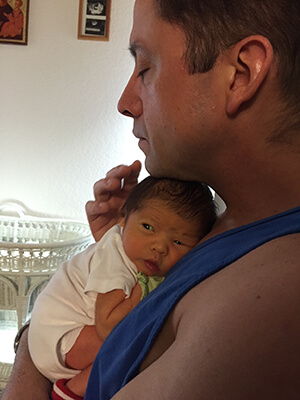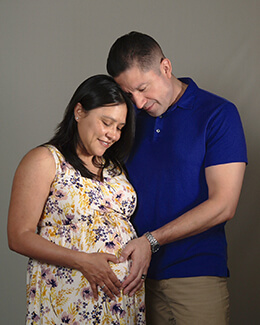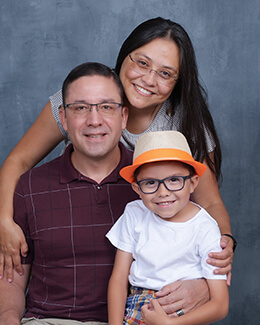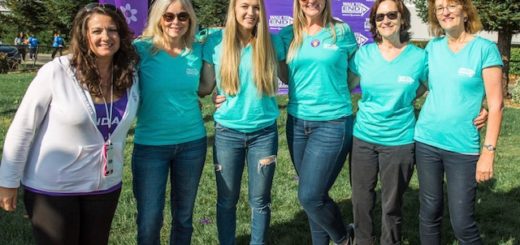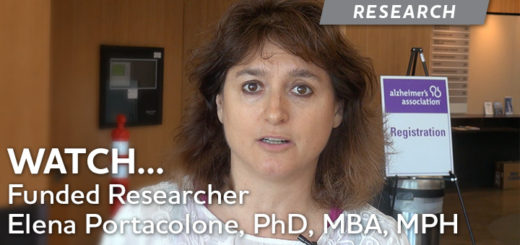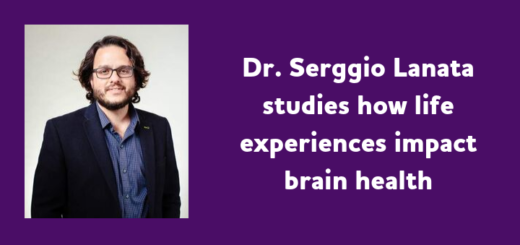Younger-onset diagnosis leads wife to find support through an unexpected group
David was in his early 50s when he started showing signs of dementia. Initially dismissed by his doctor because of his age, David and his wife Eva had to push to get an official diagnosis of younger-onset Alzheimer’s disease. Eva shares how she shared the news with their 5-year-old son and how she found support by volunteering for the Walk to End Alzheimer’s Committee in Fresno.
A kind caring man
David is a smart, genuine, honest man who cares about helping people. Through his initial career as a social worker, he found that his passion best fit with the changes he could make through public policy, specifically in the realm of mental health. “He wanted to make a mark here,” said his wife, Eva. “He helped implement what is now known as the funding for mental health [in a local community agency]. He was very involved in mental health because of [the needs of] his [older] son.”
When Eva met David, through work, his primary focus was caring for his older son and making sure he had the best care David could find. Eventually, Eva and David would get married and have a son together, who is now seven.
Too young for Alzheimer’s
Eva was the first to notice that David was struggling at work. “He was doing strange things that were annoying,” said Eva. “I’d say ‘What are you talking about? Go back to work.’” Eva didn’t realize this was the first signs of dementia.
A few years later, David’s work noticed his performance had declined. As this was out of character for David, the couple was surprised that their place of employment didn’t seem concerned about David’s mental health. Instead, they issued a reprimand. This caused David so much anxiety that he began to have panic attacks which landed him in the hospital more than once. It was then that Eva began to wonder if it was time for David to retire.
They had gone to see a neurologist, that doctor had dismissed David’s concerns. As a healthy man in his early 50s, this neurologist believed that David was fine. With the support of their primary provider, they were able to find a second opinion. This neurologist ran some tests over several months. There he saw some abnormalities and referred David to a medical facility for further testing. There, David received a spinal tap and, in 2022, was diagnosed with younger-onset Alzheimer’s at the age of 53.
“It was so out of left field,” said Eva. “We didn’t expect anything like that. [I thought it must be] something growing [in his brain] and blocking something, and it’s not allowing him to move or think the way he should. I thought they’re going to do something and it’s going to be fixed. When they told us he had younger-onset Alzheimer’s disease. It was shocking.”
Younger-onset Alzheimer’s
If Alzheimer’s disease affects a person under 65, it is considered to be younger-onset Alzheimer’s. Like many people with younger-onset Alzheimer’s, receiving an accurate diagnosis may be difficult. It’s not uncommon to be told that the symptoms may be related to stress, menopause or depression. This can lead to misdiagnosis (sometimes multiple times) and incorrect treatment.
Eva did her own research and found the Alzheimer’s Association. The couple drove to the local office in Fresno, California to speak with staff. “I got the feeling they didn’t realize [David] was the one [with the disease] until he started interacting,” said Eva. “He presents well. If you met my husband, you wouldn’t know anything was going on.”
Because people living with younger-onset Alzheimer’s are so young, people may not believe they have the disease and may question or dismiss their diagnosis. Stigma may cause them to withdraw from relationships and become isolated.
This is especially true when it came to the medical and financial needs that Eva now handles on David’s behalf. “I’m the wife, I’m the caregiver. I’m coordinating his care and there is always pushback,” said Eva. “I have to [tell people], ‘No you’re talking to me.’ I keep the durable power of attorney and his advance directive handy. I have copies in my bag to be sure they understand this is not normal. I’m not being weird; I’m just caring for my husband.”
Telling their son
Another hurdle David and Eva had to face was how to tell their then five-year-old son about his dad’s diagnosis. A friend who works with children advised them to wait to update their son.
“I talked to my good friend,” said Eva. “[He said], ‘He understands more than you think. Speak to him in plain language at his level in a respectful way. Don’t get ahead of yourself if you don’t think he’s ready, wait for the right moment.’
“I waited for him to notice things were happening and said, ‘Ok it’s time to explain.’ We sat down with him and said, ‘Daddy has a condition with his brain and the way it process things. His brain will get older, and we’ll need to be patient and help him with things as time goes by.’ He asked a few questions, but he understood the concept.”
Now, their son steps in to help his dad whenever David gets stuck. Eva shares, “We’re waiting for [David] to remember what he was going to say and he says, ‘It’s okay everybody, this is normal. He forgets things, he’ll remember.’ Our son puts everyone at ease.”
Joining the committee
In 2023, Eva received an email about Walk to End Alzheimer’s – Fresno-Madera. She was unable to attend. This year, she received an invitation to a party that brought together people who might be interested in learning more about the event. The couple were excited and decided to go. “My husband, son and I met the ladies [on the Committee],” said Eva. “It was nice to connect.”
The Alzheimer’s Association Walk to End Alzheimer’s® is the world’s largest fundraiser for Alzheimer’s care, support and research. Committee members play a key role in the success of each event.
Despite having never been to a Walk event, Eva decided she wanted to join the Committee and has been participating ever since. “I enjoy being with other people,” said Eva. “To volunteer for Walk and to connect with people who understand what I’m going through. You don’t find people who know what I’m going through at the store when you go shopping. [People on the Committee] know what it’s like to live with someone with Alzheimer’s.”
Enjoying today and the present moment
Eva knows this is just the beginning of their family’s Alzheimer’s journey. As David’s disease continues to progress even their son knows time together as a family of three is coming to an end. The three of them are doing their best to stay present and enjoy the time they have together.
“Our son knows that is what is going to happen at the end,” said Eva. “Sometimes he’ll worry, and he gets sad at times. I tell him, ‘We worry about today today and we worry about tomorrow tomorrow. Right now, Daddy is here and we should take advantage of the time we have and make memories together.”
For more information on younger-onset Alzheimer’s vist alz.org/youngeronset.
You can join Eva, David and their son’s Walk team, L1F3T1M3 or start your own team for the Walk to End Alzheimer’s – Fresno-Madera on October 19, 2024 at Woodward Park. Not in Fresno or Madera counties? Visit alz.org/walk to find a Walk near you.





